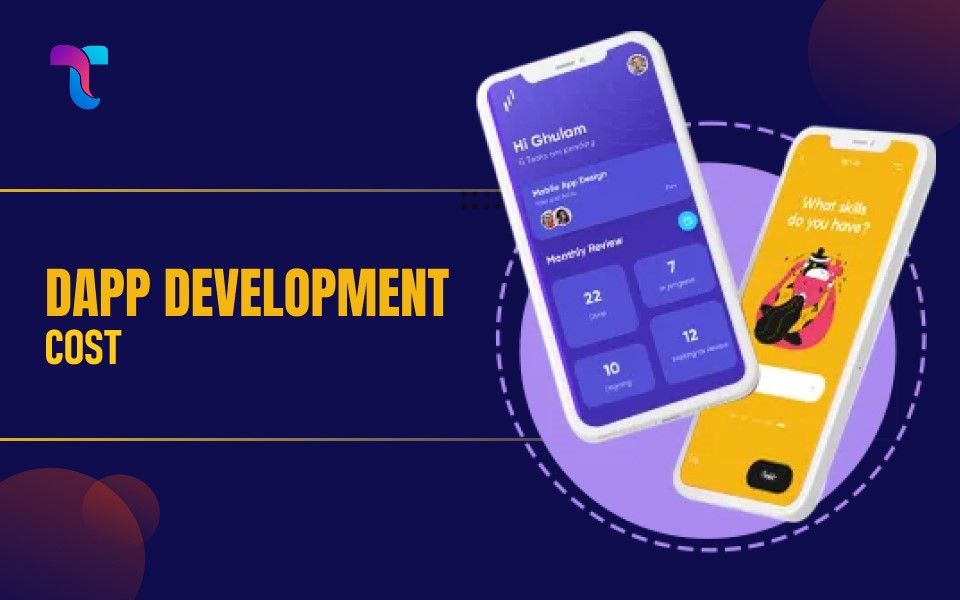Decentralized applications (DApps) are revolutionizing industries by offering transparency, security, and user autonomy. Businesses and startups are increasingly turning to DApp development to tap into blockchain's potential. However, one of the most critical questions before starting a DApp project is: How much does it cost to develop a DApp?
The cost of building a DApp in 2025 depends on various factors, including the complexity of the project, blockchain selection, smart contract development, UI/UX design, security measures, and post-launch maintenance.
In this guide, we will break down the key cost-influencing factors so you can plan your DApp budget effectively.
Complexity and Scope of the DApp
The more complex your DApp, the higher the development cost. Complexity depends on:
Basic DApp (Simple Features)
- Single-functionality smart contract.
- Minimal UI/UX design.
- Few blockchain interactions.
- Example: A simple token swap platform.
- Estimated Cost: $10,000 – $30,000
Medium Complexity DApp
- Multiple smart contracts.
- Moderate UI/UX features.
- Integration with external APIs.
- Example: NFT marketplaces or gaming DApps.
- Estimated Cost: $30,000 – $80,000
Highly Complex DApp (Enterprise-Level)
- Multiple blockchain integrations.
- Advanced smart contracts with oracles.
- AI-powered automation or cross-chain functionality.
- Example: Decentralized exchanges (DEXs), DeFi lending platforms.
- Estimated Cost: $100,000 – $500,000+
The more features and functionalities you require, the higher the development costs due to the increased workload, testing, and security requirements.
Choice of Blockchain Platform
The blockchain network you choose significantly impacts costs, as different networks have varying transaction fees (gas fees) and development complexities.
Popular Blockchains and Their Cost Implications
- Ethereum
○ Most popular blockchain for DApps.
○ High gas fees but a strong developer community.
○ Cost Impact: Expensive due to gas fees and network congestion.
- Binance Smart Chain (BSC)
○ Lower gas fees compared to Ethereum.
○ Suitable for DeFi and NFT projects.
○ Cost Impact: More affordable than Ethereum but still requires experienced developers.
- Solana
○ High-speed transactions with low fees.
○ Ideal for high-performance DApps.
○ Cost Impact: Affordable transactions but requires Rust programming expertise.
- Polygon (MATIC)
○ Layer-2 solution for Ethereum, reducing costs.
○ Cost Impact: Lower fees but still benefits from Ethereum's security.
- Avalanche
○ High throughput and lower gas fees.
○ Cost Impact: Competitive pricing for scalable applications.
Choosing a blockchain affects both transaction fees and development complexity, directly influencing the total budget.
Smart Contract Development
Smart contracts are the backbone of any DApp, automating processes and transactions. The cost of smart contract development depends on:
- Complexity of Logic: More complex contracts require extensive coding and testing.
- Security Requirements: Secure contracts demand in-depth auditing and gas optimization.
- Third-Party Audits: Firms like CertiK and OpenZeppelin charge $5,000 – $50,000 per audit, depending on complexity.
A simple smart contract for token creation may cost $5,000 – $10,000, while complex DeFi protocols can exceed $100,000 due to extensive security measures.
Frontend and Backend Development
The user interface (UI) and backend development play a crucial role in user experience.
Frontend Development Cost
- Simple UI (Basic DApp): $5,000 – $15,000
- Advanced UI (Complex DApp): $20,000 – $50,000
- Fully Custom UI/UX with Animations: $50,000+
Backend Development Cost (Optional for Hybrid DApps)
- Node.js, Firebase, or AWS integration: $10,000 – $30,000
- Off-chain database management: $15,000 – $40,000
DApps that rely purely on blockchain (no centralized backend) reduce backend costs but may require advanced smart contracts to handle data management.
Security and Audits
Security is non-negotiable in DApp development. Since blockchain transactions are irreversible, a single vulnerability can lead to massive financial losses.
Security Measures and Their Costs:
- Smart Contract Audits: $5,000 – $50,000
- Bug Bounty Programs: $10,000 – $100,000 (based on severity of bugs)
- Multi-Signature Wallets: $2,000 – $10,000
- Data Encryption: $5,000 – $20,000
Investing in robust security measures minimizes the risk of hacks and exploits, ensuring long-term success.
Third-Party Integrations
DApps often integrate with external services for enhanced functionality. Some common integrations include:
- Wallet Support (MetaMask, Trust Wallet, WalletConnect): $5,000 – $15,000
- Oracle Integration (Chainlink, Band Protocol): $10,000 – $30,000
- Fiat Payment Gateways (MoonPay, Wyre): $15,000 – $40,000
- Cross-Chain Bridges (Ethereum to BSC, Solana, Polygon): $30,000 – $100,000
The more third-party integrations required, the higher the total budget due to licensing fees and development complexity.
Post-Launch Maintenance and Updates
Once your DApp is live, ongoing maintenance is essential for security patches, feature updates, and performance optimization.
Annual Maintenance Costs:
- Basic Maintenance: $10,000 – $30,000/year
- Regular Updates & Feature Enhancements: $30,000 – $80,000/year
- Enterprise-Level Maintenance (24/7 Support): $100,000+/year
Neglecting maintenance can lead to security vulnerabilities and poor user retention, so budgeting for updates is crucial.
Marketing and User Acquisition
Even the best DApp won’t succeed without a strong marketing strategy.
Marketing Costs:
- Community Building (Telegram, Discord, Twitter): $5,000 – $20,000
- Influencer Marketing & PR: $10,000 – $50,000
- Referral Programs & Airdrops: $20,000 – $100,000
- SEO & Content Marketing: $5,000 – $20,000
A well-executed marketing campaign ensures higher adoption rates and long-term growth.
Final Cost Breakdown: How Much Does a DApp Cost?
|
DApp Type |
Estimated Cost |
|
Simple
DApp |
$10,000 – $30,000 |
|
Medium-Complexity
DApp |
$30,000 – $80,000 |
|
Complex
DApp (DeFi, NFT, DEX, P2E Game) |
$100,000 – $500,000+ |
The final cost depends on your project’s unique requirements, security needs, and marketing budget.
Conclusion
Building a successful DApp requires careful budgeting across development, security, integrations, and marketing. While costs vary based on complexity, investing in a well-optimized and secure DApp is essential for long-term success.
If you’re looking for expert DApp developers to bring your idea to life, Technoloader offers cutting-edge dApp development services tailored to your needs. Contact Technoloader today and build your future-ready DApp with confidence!
